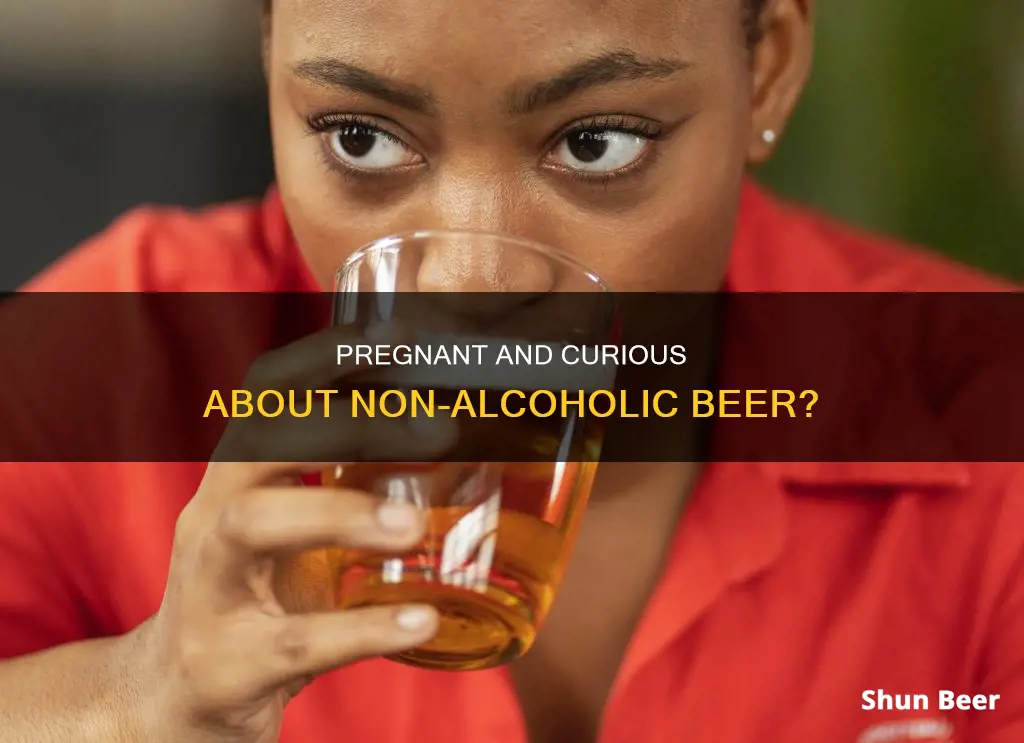
Pregnancy is a time when expectant mothers prioritise the health and well-being of their baby, and many women seek alternatives to alcohol while still wanting to enjoy the taste of a refreshing beverage. Non-alcoholic beer has emerged as a popular option, but is it safe to consume during pregnancy?
Non-alcoholic beer is regular beer with an alcohol-by-volume (ABV) content of less than 0.5%. While research has shown that beverages with 0.5% ABV or less have no physiological effects on the body and can't cause intoxication, leading health organisations still recommend that zero alcohol be consumed during pregnancy. This is because consuming alcohol during pregnancy can pose serious risks to both the mother and the developing baby, including an increased chance of miscarriage, stillbirth, and premature birth.
In addition, studies have shown that non-alcoholic beverages can sometimes contain more alcohol than what is stated on the label, with some brands claiming to have zero alcohol levels actually containing up to 1.8% alcohol. As such, it is generally recommended to avoid non-alcoholic beer during pregnancy and opt for alcohol-free mocktails or drinks labelled alcohol-free instead. These drinks are required by law to contain no traceable alcohol.
| Characteristics | Values |
|---|---|
| Definition | Beer with an alcohol-by-volume (ABV) content of less than 0.5% |
| Safety during pregnancy | Not recommended due to potential alcohol content and associated risks |
| Safety while breastfeeding | May be safe in moderation, but brief delay in breastfeeding recommended |
| Alternative options | Alcohol-free mocktails, herbal teas, infused water, fruit juices |
| Impact on fetal development | Potential range of developmental abnormalities known as fetal alcohol syndrome (FAS) |
| Health implications for mother | Potential link to high blood pressure during pregnancy |
What You'll Learn

What is non-alcoholic beer?
Non-alcoholic beer is a beer that has either had the alcohol removed or has been brewed to contain less alcohol than the legal limit. According to the U.S. Food and Drug Administration (FDA), beverages can claim to be non-alcoholic as long as they don't exceed 0.5% alcohol by volume (ABV). However, it's important to note that even at this low percentage, there is still a chance of trace amounts of alcohol being present in the drink.
The process of making non-alcoholic beer involves either controlling the brewing process to limit the amount of alcohol or removing the alcohol after fermentation through heating or filtration. Some companies have developed high-tech methods to produce non-alcoholic beers that taste more like traditional craft beers without adding sweeteners.
Non-alcoholic beers are a popular option for those looking to reduce their alcohol intake or maintain a healthy lifestyle. They are often marketed as a healthier alternative to regular beer, as alcohol is considered a toxic and psychoactive substance linked to chronic diseases. However, it's important to note that non-alcoholic beers still contain minimal amounts of alcohol, and there is limited research on their safety during pregnancy. While most experts recommend complete abstinence from alcohol during pregnancy, some research suggests that light drinking may not have negative effects.
In summary, non-alcoholic beers are beverages that have minimal alcohol content, typically less than 0.5% ABV. They are produced through various methods to remove or limit alcohol content and are often marketed as a healthier alternative to regular beer. While they may be a good option for those looking to reduce their alcohol intake, it's important to make informed choices, especially during pregnancy, as the safety of consuming non-alcoholic drinks in this context is not yet fully understood.
Beer Drinking: A Cause for Low Platelet Counts?
You may want to see also

Is non-alcoholic beer safe during pregnancy?
Pregnancy is a time when expectant mothers prioritise the health and well-being of their baby, and many women seek alternatives to alcohol while still wanting to enjoy the taste of a refreshing beverage. Non-alcoholic beer has emerged as a popular option, but is it safe to consume during pregnancy?
Understanding Non-Alcoholic Beer
Non-alcoholic beer is regular beer with an alcohol-by-volume (ABV) content of less than 0.5%. There are different methods of producing non-alcoholic beer, including brewing regular beer and then removing the alcohol, or stopping the fermentation process before it reaches a higher alcohol content. If crafted properly, non-alcoholic beer can taste just like its alcoholic counterpart.
The Risks of Alcohol Consumption During Pregnancy
It is widely accepted among healthcare professionals that consuming alcohol during pregnancy can pose serious risks to both the mother and the developing baby. Alcohol can increase the chances of miscarriage, stillbirth, and premature birth. Furthermore, it is linked to a group of conditions known as Fetal Alcohol Spectrum Disorders (FASD), which can cause physical, mental, and behavioural impairments in children exposed to alcohol in the womb.
Given these risks, leading organisations such as the American College of Obstetricians and Gynecologists (ACOG) and the Centers for Disease Control and Prevention (CDC) advise pregnant women to completely abstain from alcohol consumption.
The Safety of Non-Alcoholic Beer During Pregnancy
Non-alcoholic beer is often marketed as a safe alternative for pregnant women, but it's important to critically evaluate its safety. Studies have shown that beverages labelled as non-alcoholic or alcohol-free can still contain trace amounts of alcohol, sometimes even higher than what is declared on the label. This discrepancy raises concerns about the safety of non-alcoholic beer during pregnancy as a truly alcohol-free option.
The Importance of Seeking Professional Advice
While it can be tempting to seek reassurance or advice from friends, family, or online sources, it is crucial to consult with your healthcare provider for personalised guidance. Every pregnancy is unique, and your healthcare provider will have the most accurate and up-to-date information regarding your specific circumstances. They can provide tailored advice based on your medical history, current health status, and any pre-existing conditions.
Alternative Beverage Options
If you're craving a non-alcoholic beer during pregnancy but want to avoid the potential risks associated with alcohol, there are plenty of alternative options available. Alcohol-free mocktails, herbal teas, infused water, and fruit juices can provide a flavorful and satisfying experience without the presence of alcohol. These options not only offer hydration but also provide essential vitamins and minerals that support a healthy pregnancy.
In conclusion, while non-alcoholic beer may seem like a tempting option during pregnancy, it is generally recommended to err on the side of caution and avoid it altogether. The potential risks associated with even trace amounts of alcohol make it advisable to prioritise the health and well-being of your baby by abstaining from alcohol during pregnancy.
Light Beer and Keto: What's the Verdict?
You may want to see also

What are the risks of drinking alcohol during pregnancy?
Drinking alcohol during pregnancy can cause a range of issues for the baby, known as fetal alcohol spectrum disorders (FASDs). This is because there is no known safe threshold for alcohol intake during pregnancy. As such, the American College of Obstetricians and Gynecologists, the Centers for Disease Control and Prevention (CDC), the Surgeon General, and medical societies from other countries, including the Society of Obstetricians and Gynecologists of Canada and the U.K.’s National Health Service, all recommend complete abstinence during pregnancy.
FASDs can cause a range of serious birth defects and contribute to cognitive impairment or other developmental disabilities. These can include:
- Abnormal facial characteristics, such as wide-spaced eyes, a smooth ridge between the nose and upper lip (philtrum), a flat nasal bridge, a thin upper lip, and an upturned nose.
- Small head circumference.
- Below-average height and weight.
- Problems with eyesight or hearing.
- Bone, heart, and kidney issues.
- Central nervous system (CNS) dysfunction.
- Behavioural issues, such as hyperactivity and impulse control.
- Learning and communication difficulties.
In addition, drinking alcohol during pregnancy increases the risk of miscarriage, premature birth, and low birth weight.
The effects of alcohol on the fetus are due to the fact that it passes through the placenta via the umbilical cord to the baby, which does not have a fully developed liver and cannot process alcohol. The high blood alcohol concentrations can also interfere with essential nutrients crossing the placenta and getting to the baby. As a result, alcohol exposure has adverse effects on brain development throughout pregnancy.
Benadryl and Beer: A Safe Mix?
You may want to see also

What are the downsides of quitting drinking?
While quitting drinking can have many benefits, there are some downsides to quitting drinking, especially in the short term. Here are some of the downsides of quitting drinking:
Withdrawal Symptoms
Alcohol withdrawal symptoms can be intense and dangerous, and they typically begin within 12-24 hours of the last drink. Initial symptoms include headaches, tremors, and mild anxiety. As withdrawal progresses, symptoms intensify, and new symptoms such as clammy skin, nausea, jumpiness, insomnia, depression, and loss of appetite can occur. The peak of withdrawal, which is typically 48-72 hours after the last drink, is the most challenging, with the possibility of seizures and delirium tremens, a rare but life-threatening condition.
Fatigue
After the intense physical and mental strain of withdrawal, it is common to experience fatigue. This fatigue can last for a week or more and may be accompanied by cravings and a desire for the comfort that alcohol provides.
Social Challenges
Enjoying alcohol in reasonable amounts can boost your mood and facilitate social bonding. Quitting drinking may lead to social challenges and make it difficult to participate in certain social activities, especially if alcohol was a central part of your social life.
Sleep Disturbances
While alcohol can help you fall asleep faster, it disrupts the quality of your sleep. During withdrawal, you may experience sleep disturbances, including difficulty falling asleep and staying asleep. However, these sleep issues are typically temporary, and improved sleep quality is often reported as a benefit of long-term sobriety.
Increased Cravings
In the initial stages of quitting, cravings for alcohol can be intense, especially when faced with triggers or during times of stress. It is important to have strategies in place to manage cravings and prevent relapse.
Emotional Challenges
Quitting drinking can lead to emotional challenges, including anxiety and depression. Alcohol can act as an emotional crutch, and removing it may bring up difficult emotions. However, in the long term, quitting alcohol can lead to improved mental health and reduced anxiety and depression.
It is important to note that the downsides of quitting drinking are typically short-lived, and the benefits of improved physical and mental health, better relationships, and reduced risk of diseases often outweigh the temporary challenges. Additionally, seeking professional support and medical supervision during the quitting process can help mitigate some of these downsides and increase the chances of long-term success.
Beer and Amoxicillin: Is It Safe to Drink?
You may want to see also

What are the alternatives to non-alcoholic beer during pregnancy?
While non-alcoholic beer is an option for those who want to avoid alcohol during pregnancy, it's important to note that these drinks can still contain up to 0.5% alcohol by volume. This means that they are not completely alcohol-free and may carry risks for fetal development. To completely eliminate the risks associated with alcohol consumption during pregnancy, it is recommended to choose drinks labelled "alcohol-free" instead of "non-alcoholic". These drinks have zero detectable alcohol and are generally made with fruit juice or soda water.
- Alcohol-free mocktails: These are drinks that are designed to mimic the taste of cocktails but without the alcohol. They are usually made with fruit juice or soda water and can be a great way to feel included in social situations without consuming alcohol. Some popular options include the Alcohol-Free Mimosa, Alcohol-Free Lemon Lavender Martini, and the Alcohol-Free Peach Bellini.
- Alcohol-removed beverages: These drinks are made using the same process as conventional alcoholic drinks, but the alcohol is removed through distillation, filtration, or evaporation. While most of the alcohol is removed, there may still be trace amounts (up to 0.5% ABV) present. Examples include de-alcoholized wine or beer.
- Non-alcoholic drinks at bars: When out at a bar or restaurant, there are still options for non-alcoholic drinks. These include soda water with a splash of pineapple juice, lemonade with a splash of soda water, or a combination of cranberry juice and soda water.
- Herbal teas: Teas made from herbs, flowers, or fruits can be a great way to add variety to your beverage options during pregnancy. Just be sure to check that any herbs are safe for consumption during pregnancy.
- Smoothies: Smoothies can be a delicious and nutritious way to get your fill of vitamins and minerals during pregnancy. Blend your favourite fruits and vegetables with ice and milk or yoghurt for a refreshing drink.
- Sparkling water: For something simple and refreshing, sparkling water is a great option. You can add a slice of lemon or lime for extra flavour.
Old Beer: Is It Safe to Drink After 5 Years?
You may want to see also
Frequently asked questions
Non-alcoholic beer can contain up to 0.5% alcohol, and there is limited research on its effects during pregnancy. The American College of Obstetrics and Gynecology (ACOG) advises that no amount of alcohol is considered safe during pregnancy. Therefore, it is recommended to choose alcohol-free mocktails or drinks labelled "alcohol-free" to eliminate any potential risks.
Alcohol consumption during pregnancy can increase the chances of miscarriage, stillbirth, and premature birth. It is also linked to Fetal Alcohol Spectrum Disorders (FASD), which can cause physical, mental, and behavioural issues in the developing baby.
There are plenty of alternative options to non-alcoholic beer during pregnancy, such as alcohol-free mocktails, herbal teas, infused water, and fruit juices. These options provide hydration and essential vitamins and minerals that support a healthy pregnancy.
While there is limited research on the effects of non-alcoholic beer during breastfeeding, it is generally considered safe. The Centers for Disease Control and Prevention (CDC) recommends waiting 2-3 hours before breastfeeding after consuming alcohol to ensure that the alcohol has left the breastmilk.







